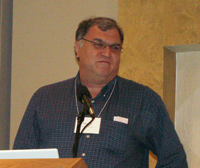Mark Potts, Founder
“If you build it they will come does not work!”
 Launched with $3 million in venture capital, one of the country’s most ambitious experiments in citizen media shut its operations in early 2007. Mark Potts, co-founder of Backfence.com, said the site ultimately failed because of internal issues, but he added, “No one doing this is really successful yet. Nobody’s figured out the right mix of advertising and marketing to make it work.”
Launched with $3 million in venture capital, one of the country’s most ambitious experiments in citizen media shut its operations in early 2007. Mark Potts, co-founder of Backfence.com, said the site ultimately failed because of internal issues, but he added, “No one doing this is really successful yet. Nobody’s figured out the right mix of advertising and marketing to make it work.”
Backfence was a portal for 13 locally operated community sites in three different parts of the country. “We picked communities with a strong sense of place and pride, defined school system, their own political system, populations around 50,000 to 60,000, communities with controversies over development.”
Potts said that grassroots marketing was very important. Backfence was out there, going to community fairs, handing out flyers, inviting people to contribute to the sites. The events calendar was the most popular feature “When people posted an event to the calendar, we’d go back and ask them if they’d post photos and highlights afterwards.”
In other words, people planning events might actually cover their own events. “This is not journalism,” Potts said. “It’s not an inverted pyramid. It’s conversation. This creates new, non-traditional story formats … where dozens of people tackle some issues. We did not predict what people would care about, what the community would coalesce around, like the plan to tear down a car dealership that was an historic site. People know what’s going on in their communities, so let them share.”
The most important lessons Potts learned with Backfence: Trust the audience. Require user registration. Let the community police itself. Leverage social networking. Keep costs as low as possible. Spend money on marketing.
And finally: It’s all local. “The key franchise left is local. Yes, hyperlocal content is really boring and mundane,” said Potts, “It’s the garden club. It’s the stoplight down their street that isn’t working or the principal that’s been fired. If you don’t live there, you don’t care. Hyperlocal is hard, but it will work. It takes time to grow a community.”
|
Click below to jump to panels: Touching the Community – Outside Traditional Media
Filling in the Gaps – Emerging Competition
Twenty in Thirty – Twenty Good Ideas for Citizen Participation
An Inside Look at the Strategy Behind LoudounExtra.com
AP’s “Now Public” Initiative
Mainstream Media Goes Hyperlocal
Lessons Learned – Backfence.com
|







